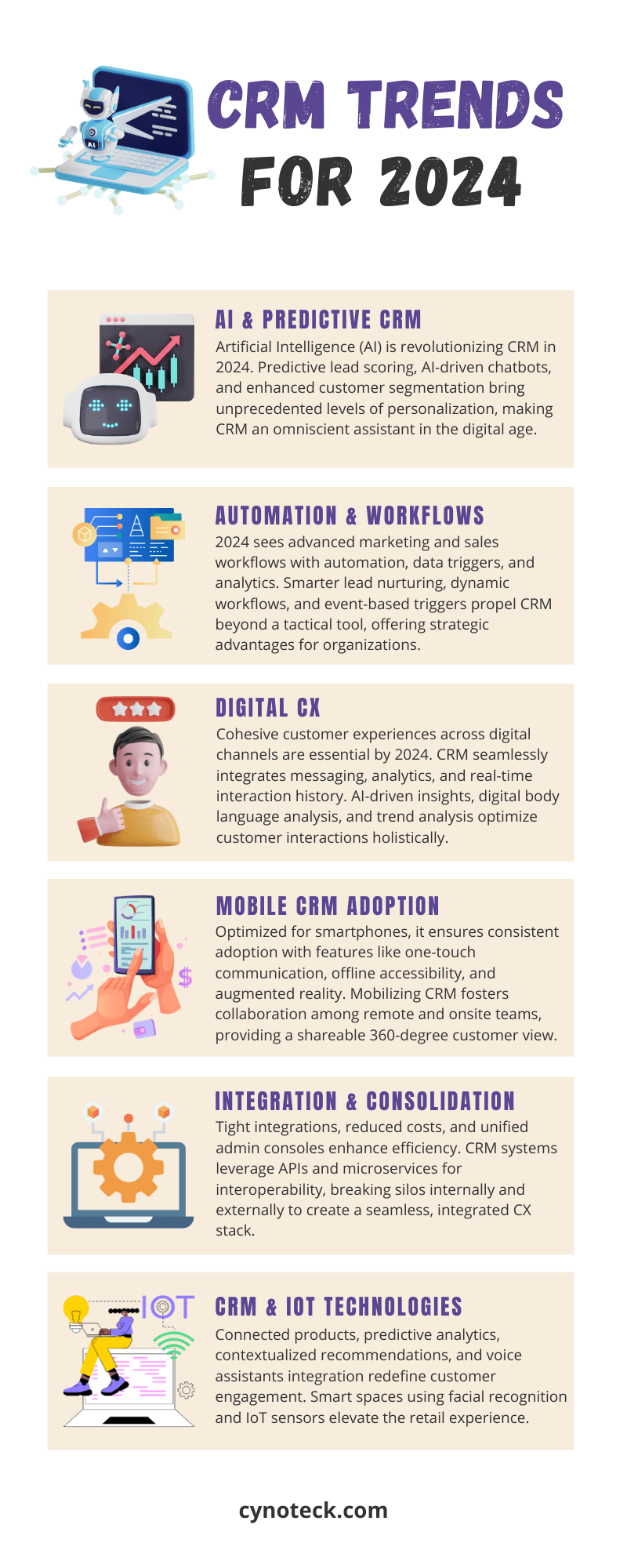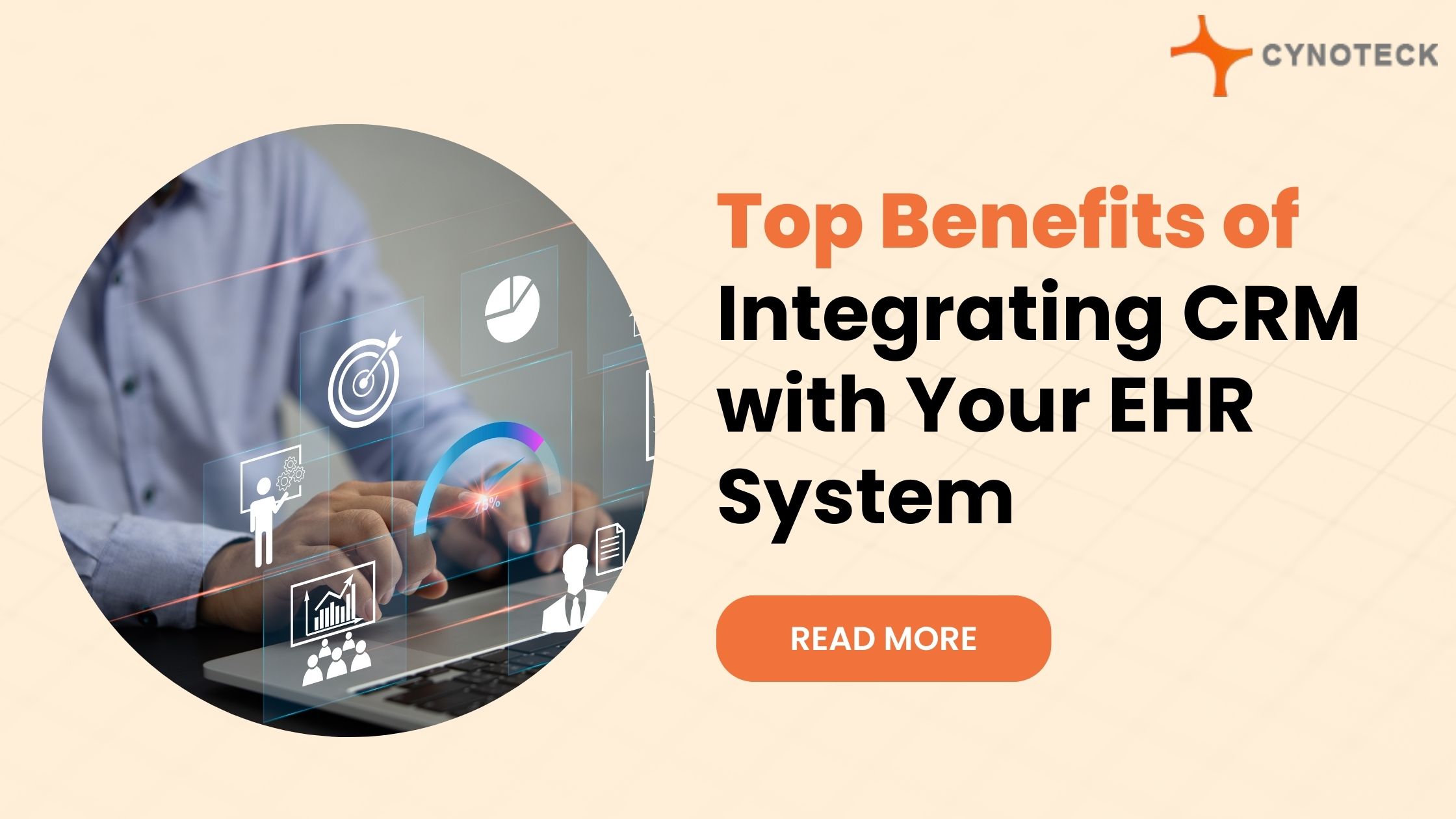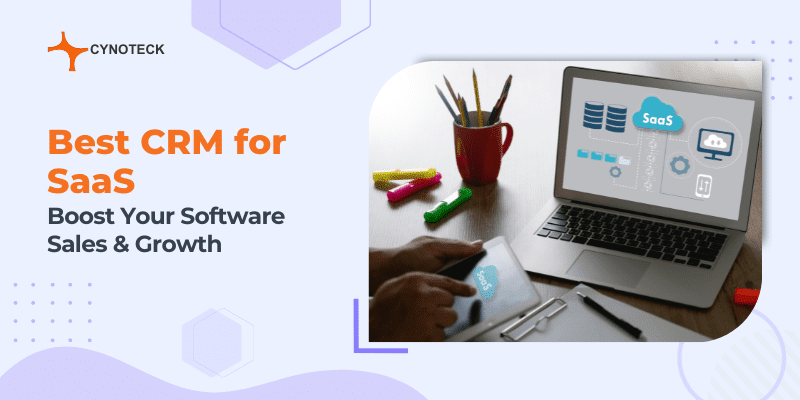Customer relationships are the lifeblood of every company. Do you feel that your business is missing a heartbeat? CRM technology works as the defibrillator that will get it pumping to save your customer experience! As we charge ahead into 2024, significant CRM innovations on the horizon could reshape how companies attract, engage, and retain their patrons.
Customer relationship management (CRM) software consolidates all interactions a business has with its customers across marketing, sales, and service channels onto a single digital platform. By tracking and nurturing customer relationships from initial targeting right through the entire lifecycle, CRM empowers companies to maximize the value of every client.
Monitoring cutting-edge CRM developments allows organizations to capitalize on the latest features that provide a competitive edge and demonstrate to customers that highly personalized, predictive, and omnichannel customer experiences are priorities.
In 2024, 50% of companies without comprehensive CRM implementations risk digitally trailing competitors and thus it becomes important that we are updated on the most sought-after trends for 2024 in CRM.
CRM Trends to watch for 2024
Let us discuss the major up-and-coming CRM trends that companies need to closely watch for 2024 planning cycles or risk getting left dizzy in the digital transformation dust.

1. AI & Predictive CRM:
Artificial intelligence and machine learning have already started transforming CRM capabilities, but companies have only just scratched the surface of what will be possible. In 2024, we expect AI automation and analytics to expand across the full range of CRM functions.
Predictive lead scoring
Predictive lead scoring will allow sales teams to identify in real-time the hottest prospects most likely to convert and ensure outreach is aligned to context like stage in buyer’s journey.
Dynamic product recommendations and personalized promotions will help marketing boost cross-sell opportunities.
Chatbots with natural language processing will be able to handle increasingly complex customer service issues without human assistance, offering accurate self-service experiences 24/7.
Segregation will increase efficiency
Segmenting customers into smaller groups unified by multiple attributes will enable far more tailored messaging aligned to individual preferences and behaviors.
With CRM platforms leveraging AI capabilities to surface the best next actions for users, customer interactions will feel more proactively personalized rather than just reactive.
CRM in 2024 will feel like an omniscient assistant delivering hyper-relevant recommendations to both customers and client-facing teams thanks to the power of artificial intelligence.
Companies that lag in adoption will quickly appear behind the digital times. To simplify, it’s all about being relevant and adopting the best practices timely.
We’ve already seen the changes that swamped many businesses in 2023 due to the advent of AI.
Also, read: 11 Best CRM for Startups to Fuel Your Business Growth in 2024
2. Automation & Workflows:
Marketing and sales workflows will become exponentially more advanced by integrating process automation, data triggers and advanced analytics. CRM platforms in 2024 will allow highly customizable workflows aligned to complex business scenarios.
Enhanced Lead Cultivation Strategies
Smarter lead nurturing protocols will enable automated multichannel drip campaigns scaled to thousands of prospects based on granular attributes and engagement metrics. Deal progression playbooks will standardize coaching best practices within sales organizations while still allowing personalization to contact needs.
Event-based triggers tied to customer actions will fire off complex sequences like automatically scheduling sales follow-ups after demonstration requests. Custom objects, variables and intelligent routing rules will support intricate decision branches for limitless workflow flexibility.
While CRM systems have had basic process builders for many years, next generation automation with dynamic input configurations, complex logic handling, and platform extensibility will transform workflows into a strategic advantage for organizations in 2024 rather than just a tactical tool.
Also, read: CRM vs Excel: Why is Excel not a Scalable System?
3. Digital CX:
By 2024, delivering cohesive customer experiences across digital channels will be table stakes. CRM systems will seamlessly integrate messaging, live chat, social media, and other engagement data into unified profiles.
Leveraging analytics, real-time interaction history across web, mobile and messaging will empower agents to hyper-personalize engagements aligned to micro-moments. Recommendation engines will cue next best actions like suggested cross-sells or prompts to switch channels as needed.
Through customer journey analytics, CRM will help organizations optimize experiences holistically across platforms. With AI filling insight gaps, predicting needs and automating mundane tasks, human agents can focus on delivering emotional value during interactions.
Digital body language analysis will enable sentiment detection to identify high risk touchpoints. Trend analysis will highlight the impact of platform experiences on conversion rates. Voice analytics will optimize IVR and contact center interactions.
4. Mobile CRM Adoption:
CRM on-the-go will become non-negotiable for field sales and service teams. Optimized for smartphones and tablets, mobile CRM apps with user experiences matching top B2C apps will drive consistent adoption.
From notifications to guided selling tools, analytics to automated capture of offline interactions, mobile CRM will provide on-ground teams access to the same information and insights as inside sales counterparts. Location integration will tag visits, determine nearby recommendations, prompt check-in requests and auto-log calls.
Integrated communication will enable one-touch dialing, calendar scheduling and email templates to streamline stakeholder interactions. Omnichannel context like recent support tickets, social media posts and product usage data will prep field reps. Tablet analytics will let teams analyze performance during pitches.
Offline mode will ensure constant access to customer data and app functionality even without connectivity. Augmented reality will overlay interactive information onto real-world environments. And mobile enablement will remain critical for training reps on products, sales skills, and service processes through microlearning apps.
By fully mobilizing CRM, companies will tap new flexibility allowing mixed teams of remote reps and onsite account managers to collaborate seamlessly. A shareable 360-degree customer view is invaluable.
Also, read: Comparing the Top 4 CRM for Investment Banking Success
5. Integration & Consolidation:
Best-of-breed point solutions will continue ceding ground to integrated CRM ecosystems capable of managing the entire customer lifecycle. Tight integrations between marketing automation, sales enablement and customer service systems will blur traditional departmental borders.
CRM platforms are expanding native feature stacks while leveraging APIs and microservices to embed specialty functionality like chat, document collaboration and payment processing. Reduced need for separate tools lowers licensing costs and data reconciliation efforts.
Common data models, nomenclature and objects across departments speeds up reporting and analysis. Unified admin consoles lower IT overhead. Master workflows can trigger sequenced multi-team hand-offs.
At the same time, CRM systems are leveraging standards-based frameworks for interoperability with adjacent enterprise systems like ERP, ecommerce, and business intelligence. Shared metadata layers connect systems at the data level while packaged connectors ease linking user interfaces and workflows.
The CRM ecosystem of the future will not just break silos internally but also seamlessly exchange context and events with external systems to create an integrated CX stack benefiting customer-facing teams.
6. CRM & IoT technologies:
CRM (Customer Relationship Management) systems are increasingly integrating with IoT (Internet of Things) technologies to provide businesses with deeper insights into customer behavior and preferences. How? Let us understand by navigating the following points:
- Connected products and assets: IoT allows companies to connect their products, equipment, and assets to collect data and communicate. For example, a vendor can connect HVAC systems at customer sites to monitor usage, schedule preventive maintenance, and gather data to personalize offerings. This data feeds into the CRM system.
- Predictive analytics: By combining IoT sensor data with CRM data like past purchases, service requests, etc., businesses can apply predictive analytics to forecast equipment failures, future sales opportunities, churn risk, and other trends impacting customer experience. This allows proactive service and tailored recommendations.
- Contextualized recommendations: With customer identity and context from IoT devices, CRM systems can provide highly personalized and timely recommendations via smart products. For example, a connected consumer appliance can order replacement parts or suggest helpful accessories based on actual usage patterns.
- Voice assistants’ integration: IoT voice assistants like Alexa or Google Home are being linked to CRM platforms to provide an integrated and conversational customer experience for queries, support requests, transactions and more.
- Smart spaces: Facial recognition, mobile location sensing and IoT sensors enable smart retail spaces. Customers can be recognized across visits to provide them with personalized attention, preferred shopping experiences and customized promotions.
Also, read: Top 10 Cloud Based CRM Software Solutions for Business Operations
New markets additions in CRM:
CRM solutions have rapidly evolved from their early roots in sales force and contact center management. Several new dimensions like advanced analytics, automation and customer engagement are transforming modern CRM suites. Let us examine some of the key market additions:
Modernizing Platforms and Architecture
Cloud emergence has been a major inflection point. As CRM migration accelerated to the cloud, the flexibility, speed, and usage-based pricing spurred adoption across more customer-facing roles.
Affordable subscription plans have put enterprise-grade capabilities within reach for SMBs. Integrations with complementary apps via APIs expanded scope. Cloud economics also enabled CRM innovation in mobility, analytics, and AI.
Expanding Capabilities and Integration
In customer analytics, machine learning is uncovering predictive insights from CRM data – be it forecasting churn risk, purchase behavior modeling or lead scoring. Sentiment analysis gauges customer lifetime value or experience metrics through voice/text.
Tools like next best action take real-time personalized decisions. Dashboarding, operational reports and data visualization have enhanced information access.
There has also been a pronounced shift towards no-code application development, workflow automation and predictive recommendations being natively built into CRM platforms.
These eases change management for business users via configurations over expensive coding. Multi-channel campaign symmetry, email marketing etc. are getting integrated for engagement.
As customers engage via mobile/social/IoT channels, CRM now ties into marketing, services, ecommerce, and community platforms. Voice, AR/VR, and conversational interfaces are emerging.
With data quality and usage intensity increasing, Data Management Platforms address governance needs. Connected CRM is undoubtedly the way forward.
Also, read: The Top Mobile CRM Apps for Streamlining Your Business
Why will it be important to balance out sophistication and a centralized view of the customers in CRM?
Balancing sophistication and a centralized customer view in CRM systems is becoming critical for businesses in the upcoming times. This requires a strategic technology approach to drive better customer experiences and business growth.
The need for a single unified view of every customer across their entire journey cannot be understated. As customers engage across more touchpoints both online and offline, their data and interactions are getting fragmented across sales, marketing, e-commerce, service channels and more.
Consolidating this into complete 360-degree customer profiles provides that much needed ‘single source of truth’ to truly understand customer behavior, preferences, and sentiment.
However, just having access to integrated customer data is not enough. Companies need to apply intelligence on top of it to draw critical insights that can drive precision targeting, hyper personalization, and predictive recommendations.
This requires sophistical techniques like machine learning, predictive analytics, sentiment analysis etc. Packaged AI is getting democratized through ready-to-use CRM capabilities for various front and back-office functions.
At the same time, over-reliance on black box algorithms without context risks incorrect and biased decisions that frustrate customers. The human aspect remains vital. Having holistic customer profiles helps apply intelligence in a contextualized manner. AI models also need transparency for human supervision.
Hence it is evident that sophistication and consolidated customer understanding must evolve together for next-gen CRM platforms. The presence of one without the other severely limits potential.
Companies that can architect smart and centralized CRM solutions will gain a sharp competitive edge through elevated customer experiences. The ultimate goal should be individualized, consistent and relevant experiences across moments powered by data and intelligence.
Also, read: A Deep Dive into Collaborative CRM: Examples and Software Tools
Implementation Guide on successful adoption of CRM trends:
- Audit & Assess:
Catalog current CRM uses, gaps, pain points through stakeholder interviews and workflow analyses. Prioritize enhancement areas tied to business goals.
- Evaluate Upgrades:
Assess the new functionality of your existing platform version or explore competitor offerings to validate fit. Cloud migration opens frequent update options.
- Phase Rollouts:
Take an agile approach when activating advanced tools. Pilot functionality with test groups before organization-wide activation.
- Proactive Training:
Get teams upskilled on updates proactively through labs, demos, and online learning versus passive emails. Adoption requires motivation.
- Simplify Navigation:
Counter feature overload by organizing functions into simplified profiles, menus and workflows tailored to user roles.
- Measure ROI:
Leverage updated reporting dashboards to highlight hard metrics on adoption and business impact. Continually fine-tune targeting and workflows per insights.
By aligning technology roadmaps to user readiness, companies can smoothly transition even casual CRM users to leverage productivity-enhancing capabilities delivering demonstrated value. The time for upgrades is now.
Conclusion:
While innovations like predictive intelligence, workflow integration across customer journeys and digitally powered field teams may seem bleeding-edge, the reality is CRM yet again is turning potential into profit with ROI-rich capabilities becoming core table stakes.
But with great power comes great complexity. As this blog outlines, successfully riding the next CRM wave requires balanced adoption of innovative features with smooth change management and guided learning fueling user motivation.
This is where a consulting partner like Cynoteck excels – in assessing your organizational CRM maturity, drafting adapting technology roadmaps calibrated to identified priorities, ironing out adoption challenges with specialized learning programs, and supporting long-term value realization through expert implementation and ongoing optimization.
Do not leave revenue goals or customer satisfaction at risk due to inadequate systems. Contact Cynoteck to future-proof your CRM today and seize first-mover advantage in 2024! Our CRM specialists cannot wait to hear your vision and start delivering on it.
Also, read: CRM vs CMS Comparison: An In-depth Look at Two Powerful Platforms
Frequently Asked Questions:
Q. What are the emerging technologies influencing CRM trends in 2024?
In 2024, emerging technologies such as artificial intelligence (AI), machine learning (ML), and blockchain will significantly influence CRM trends. AI and ML enhance customer insights, enabling predictive analytics for personalized customer experiences. Blockchain ensures secure and transparent transactions, boosting trust in customer relationships.
Q. How is the customer experience evolve with CRM in 2024?
Customer experience in 2024 is evolving with a focus on hyper-personalization and omnichannel engagement. CRM systems leverage advanced analytics to understand customer preferences, allowing organizations to deliver tailored interactions across various channels, including social media, chat, and voice, to enhance overall customer satisfaction.
Q. What role does data privacy play in CRM trends for 2024?
Data privacy is a critical aspect of CRM trends in 2024. With increasing regulations and customer concerns about data security, organizations are prioritizing robust data protection measures. This includes adopting technologies like differential privacy and implementing strict compliance measures to ensure customer data is handled responsibly.
Q. How are mobile CRM applications evolving in 2024?
In 2024, mobile CRM applications are evolving to offer seamless user experiences and enhanced functionality. With the integration of augmented reality (AR) and virtual reality (VR), organizations can provide innovative ways for users to interact with their CRM systems. Mobile CRM is also becoming more intuitive, allowing users to access real-time data and perform tasks on the go.
Q. What role does sustainability play in CRM strategies for 2024?
Sustainability is a key consideration in CRM strategies for 2024. Organizations are increasingly integrating environmentally responsible practices into their customer relationship management. This includes adopting eco-friendly technologies, reducing carbon footprints, and aligning CRM strategies with sustainable business practices to meet the growing demand for socially responsible business operations.

CRM Consulting services
Do you want to implement a CRM system within your organization? Connect with our CRM Experts today!




